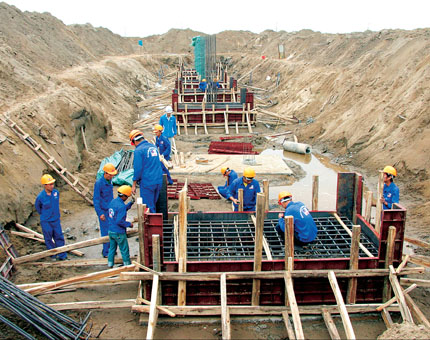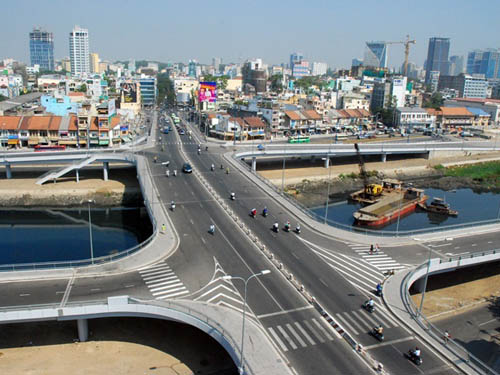Establishing Discipline in Public Investment
To date, the legal system for public investment management has been incomplete and inconsistent, dispersed across various legal documents, lacking sanctions and management, and oversight measures, leading to multiple existing issues and limitations. Investments remain scattered and fragmented, investment plans are segmented year by year, and investment efficiency is poor.
The status of construction exceeding the allocated capital plan, causing excessive basic construction debt, and imposing significant pressure on the balance of the state budget (NSNN) at all levels, has placed the Central Budget in a passive position for many years.
At the 6th session, the National Assembly discussed and gave opinions at the Group and Hall on the Public Investment Law project. According to the program of the 7th session of the XIII National Assembly, the Public Investment Law project will be submitted to the National Assembly for consideration and opinion on May 24, 2014, before approval on June 18, 2014.
Tightening Public Investment Discipline
The Draft Law stipulates the direction of enhancing discipline and accountability in public investment management, from the stage of policy approval, and capital source appraisal, aiming to limit the "ask-give" mechanism, avoid dispersed investments causing waste, prevent corruption, and improve the efficiency of public investment capital usage. According to the Draft Law, all subjects using public investment capital, including enterprises of all economic sectors, are regulated by this law. Investment activities using state capital at enterprises will be regulated under the Law on Management and Use of State Capital Invested in Production and Business projects, also submitted to the National Assembly for consideration and opinion at this 7th session.
According to the draft law, public investment capital sources include state budget capital, national government bonds capital, local government bonds capital, official development assistance (ODA) capital, preferential loans from foreign donors, development investment credit capital of the state, investment capital from revenue retained for investment but not included in the state budget balance, and loan capitals of local budgets for investment.

According to current Budget Law regulations, some investment capital sources from revenue retained for investment are not included in the state budget balance. However, these capital sources have a significant value, equivalent to the total annual central budget investment capital. If not specified in the draft law, there will create a legal gap concerning these investment capital sources. Should the revised State Budget Law include national government bonds, Government of Vietnam bonds, and other revenue sources in the state budget balance, the provisions in this law will not contradict the prospective revised State Budget Law.
Enhancing Decentralization
The Draft Law has institutionalized the process of deciding investment policies, which is the most important innovation in the Public Investment Law; it is the starting point determining the correctness and effectiveness of the program or project. It aims to prevent arbitrary, subjective, willful, and simplistic decision-making in investment policies while enhancing the accountability of the decision-makers. Practices in public investment management in recent years have shown that wastage and losses have various causes such as lax management, dispersed investments, corruption, and fraudulent construction,... but the biggest waste is due to incorrect and ineffective investment policies.
This situation has persisted for many years without being completely resolved. Therefore, in the Draft Law, provisions on decentralization, procedures, and approval of investment policies and investment decisions are regulated. Thus, compared to current regulations on managing public investment programs and projects, the draft law includes new, stricter provisions on decentralization of authority for investment policy decisions, investment decisions, and identification of individual and collective responsibilities during implementation. The Draft Law mandates that all public investment programs and projects must undergo investment policy approval, unlike current regulations that only require policy approval from the National Assembly for significant national programs and projects.
Additionally, along with investment policy approval, the Draft Law also stipulates enhancement and innovation in capital source appraisal and capital balance, considering it one of the most important components of public investment program and project appraisal. Currently, many ministries and central authorities and local authorities do not prioritize capital source appraisal and capital balance or perform superficially; they decide on programs and projects on a scale many times larger than their fiscal capacity and the ability to supplement from higher-level budgets. Mandating capital source appraisal and capital balance (institutionalizing guidelines and solutions in Directive No. 1792/CT-TTg dated October 15, 2011) will enhance the quality and efficiency of public investment programs and projects.
Long-term Vision for Public Investment
The implementation of the medium-term investment plan marks a significant reform in investment planning; shifting from short-term, annual planning to a 5-year medium-term plan, aligning with the 5-year socio-economic development plan. This is the second major innovation in public investment management. Building and implementing the medium-term investment plan will ensure the nation's large economic balances and enable ministries, central authorities, and local authorities to know their investment capital for the 5-year plan, thereby making more correct and effective investment policy decisions; particularly, it creates transparency in the allocation of state resources. The draft law dedicates an entire chapter to the formulation, appraisal, approval, and allocation of public investment plans (Chapter III), covering the entire process from planning to appraisal, approval, and allocation of medium-term and annual investment plans according to specific criteria and conditions for selecting investment program and project categories based on each capital source. The formulation, appraisal, and approval process will still follow the current decentralization; the entity managing the capital source will be responsible for formulating and approving the plan based on the principles stipulated in the Public Investment Law.
The public investment planning process includes many new, scientifically and practically grounded elements, such as the medium-term investment plan ensuring that approved programs and projects receive sufficient funding for completion according to the approved decision, addressing current issues of unbalanced funding and fragmented, annual investments. The criteria and principles for formulating medium-term and annual investment plans for all capital sources are detailedly regulated to ensure that the plans align with the objectives, directions, strategies, zoning, and socio-economic development plans.

According to the draft law, conditions for projects and programs to be included in the medium-term investment plan project portfolio are that they must be approved by competent authorities, selected based on priority levels, urgency, and the ability to balance funding sources. The medium-term investment plan provides a comprehensive overview of the State's investment activities, limiting dispersed investments, splitting projects, and the state of just constructing while completing investment procedures, allowing ministries, central authorities, and local authorities to know their capital for the 5-year plan and proactively make more precise and effective investment policy decisions.
Legislation of Public-Private Partnership (PPP) Investment form
The draft law includes provisions on the concept and principles for regulating the PPP investment model. Given the limited public investment capital and the high demand for national development, the application of the PPP investment model is extremely practical. However, this is a new investment model in our country, thus not yet widespread and relatively unstable. The draft law introduces the PPP concept, encouraging organizations and individuals to invest directly or through PPP in economic and social infrastructure projects and public service provision, prioritizing PPP implementation for projects with revenue potential. To ensure the interests of organizations and individuals implementing PPP projects, the State’s public investment capital will be tightly managed; other economic sectors' capital contributions to PPP projects will be facilitated, allowing them to implement projects independently according to investment objectives and commitments with the State. The Government of Vietnam will provide detailed guidance on the implementation of this investment model.
Enhancing Transparency and Community Supervision
The draft law includes detailed provisions on transparency principles and content in public investment, the rights and responsibilities of leaders, and individual responsibilities in public investment implementation to enhance transparency in public investment.
Regulations on gathering community opinions in project areas for decisions on significant national projects, Group A projects, projects with large-scale relocation, resettlement, projects with potential major environmental impacts, projects directly affecting the local community's socio-economic life concerning investment policies, construction, land use, waste handling, environmental protection, compensation, and resettlement plans according to legal regulations.
The draft law also stipulates the role of the Vietnam Fatherland Front in coordinating with political-social organizations and social organizations in annually developing community supervision plans for investment programs and projects in their localities, covering content such as monitoring investors' compliance with investment, construction, land use, waste handling, environmental protection regulations; supervising compensation, land clearance, and resettlement plans to ensure people's rights; comprehensively supervising public investment programs and projects involving people's contributions; monitoring the implementation and progress of public investment programs and projects; overseeing transparency in public investment; detecting activities detrimental to community interests; identifying negative project impacts on the community living environment during investment implementation and project operation; identifying activities causing wastage, capital, and asset losses related to the project.
Source: Vietnamnet.vn
- Number of deputy directors of departments in Vietnam in accordance with Decree 45/2025/ND-CP
- Cases ineligible for pardon in Vietnam in 2025
- Decree 50/2025 amending Decree 151/2017 on the management of public assets in Vietnam
- Circular 07/2025 amending Circular 02/2022 on the Law on Environmental Protection in Vietnam
- Adjustment to the organizational structure of the Ministry of Health of Vietnam: Certain agencies are no longer listed in the organizational structure
- Vietnam aims to welcome 22-23 million international tourists in Vietnam in 2025
-

- Notable new policies of Vietnam effective as of ...
- 16:26, 11/04/2025
-
.Medium.png)
- Notable documents of Vietnam in the previous week ...
- 16:21, 11/04/2025
-
.Medium.png)
- Notable documents of Vietnam in the previous week ...
- 16:11, 02/04/2025
-
.Medium.png)
- Notable new policies of Vietnam to be effective ...
- 16:04, 02/04/2025
-
.Medium.png)
- Notable new policies of Vietnam effective from ...
- 14:51, 21/03/2025
 Article table of contents
Article table of contents
